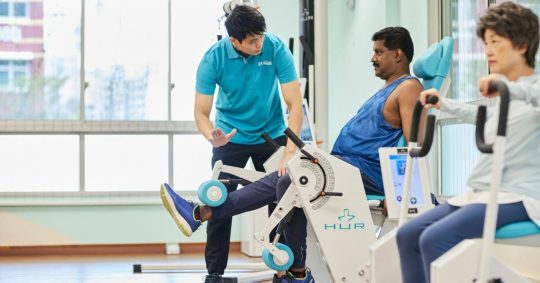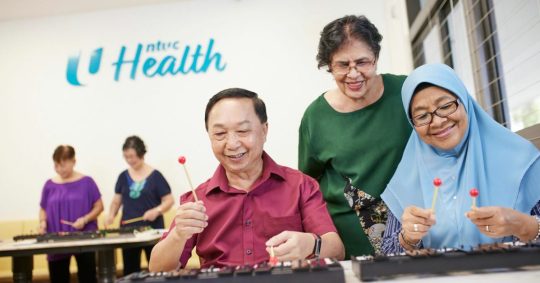
In caring for the elderly, complaints about aches and pains, a change in mood and activity levels are often attributed to ageing. Many of us would not relate these to depression. Yet these could be signs of depression in elderly which can be prevented and treated.
According to national elderly depression statistics in Singapore, a study by IMH conducted in 2013 found a prevalence of 3.7% (1 in 27) for depression among adults aged 60 and above1.
We believe that prevention is better than cure. Through raising mental health awareness and staying physically and socially active, our seniors can better protect their mental health as they age.
Jump to the following sections:
Why we need to talk about seniors and their mental health
Did you know that elderly suicide rates have increased steadily over the years2? Because of age, seniors are more likely to suffer from depression. Research shows that as the body changes with age, one’s risk of experiencing depression might increase3.
The COVID-19 pandemic added extra stress and took a toll on many of our seniors’ psychological well-being. The constant changes at short notice, restrictions on visiting friends and family, grief, and even income loss all added to their mental burden.
Coming from a generation with a tendency to hold a deep stigma against mental health issues, seniors may face difficulties in opening up to others. As such, many of them suffer alone, without seeking help from mental health support services.
However, by connecting with others and keeping socially engaged, seniors can cultivate a stronger sense of belonging and increase their self-esteem levels4. Engaging in daily physical activities would help in reducing anxiety to prevent depression. Understanding how to maintain our elders’ mental well-being is also important.

Solution One: Educating seniors and caregivers on the importance of mental health
In a survey done by the National Council of Social Services in 20185, more than five in ten respondents said they were not willing to live with, live nearby, or work with a person with a mental condition. Six in ten believe that mental health conditions are caused by a lack of self-discipline and willpower.
To educate the public on mental health, more community outreach efforts could be made. Public talks could help in disseminating information to dispel certain myths about mental health, such as an individual having mental health conditions because of character flaws.
Through these efforts, seniors and their caregivers could learn facts about mental health and be encouraged to actively find out more information. With many seniors embracing technology today, using social media and videos can help them on this learning journey.
Not sure how to talk about mental health in Chinese? Here is a video to help!
Seniors looking to support their mental health can get in touch with NTUC Health's Community Resource Engagement and Support (CREST) team. CREST facilitates early detection of mental health issues and provides timely assistance and care coordination, ensuring seniors remain engaged and supported in their community. For support and guidance, seniors and their caregivers can contact NTUC Health from Monday to Friday, 8.30am to 6pm, at 9455 2308 or email crest@ntuchealth.sg.
Solution Two: Promoting physical activity and social engagement for our seniors

After helping seniors learn the facts of mental health, we should encourage them to keep active socially and physically as a means to maintain their mental well-being.
Exercise helps reduce feelings of depression and anxiety, while keeping you alert. At our senior gyms, we have a range of strength training activities to accommodate the needs of seniors. Our trainers will help to adjust the intensity of the exercises to keep the training challenging but manageable for our seniors.

Over at our Active Ageing Centres, seniors can volunteer to give back to the community. They can lead classes, create interest groups or simply offer companionship to others. By taking part in such activities, seniors can find purpose and meaning in their lives.
Our Active Ageing Centres also serve as drop-in centres for seniors in the neighbourhoods around Singapore. These places are where seniors can come together for group activities and interact with their peers who also live nearby.
Click here to learn more about our active ageing services and be a part of a vibrant community of active agers!

Summary
It is important for seniors to care for their mental health and prevent depression. Besides understanding and learning about mental health issues, seniors need to ensure they are physically and socially active to maintain their mental well-being. NTUC Health’s senior gyms offer many strength training programmes led by qualified trainers to accommodate our seniors’ needs. Our Active Ageing Centres also serve as spaces for seniors to connect with one another and participate in activities.
Where to get help:
Samaritans of Singapore Hotline: 1800 221 4444
Institute of Mental Health’s Helpline: 6389 2222
Singapore Association of Mental Health Helpline: 1800 283 7019
You can also find a list of international helplines here. If someone you know is at immediate risk, call 24-hour emergency medical services.
1 Chong, S. (2022 March 1). IMH rolls out the second Well-being of Singapore Elderly study to establish the latest prevalence and incidence of dementia and depression in elderly residents. Retrieved October 19 2022 from https://www.imh.com.sg/Newsroom/News-Releases/Documents/MEDIA_RELEASE_Second_WISE_Mar2022.pdf
2 Rashith, R. (2018, July 29). Number of suicides among seniors hits record high. Retrieved March 18, 2021, from https://www.straitstimes.com/singapore/number-of-suicides-among-seniors-hits-record-high
3 Aging and depression. (n.d.). Https://Www.Apa.Org. Retrieved July 14, 2022, from https://www.apa.org/topics/aging-older-adults/depression
4 The benefits of social engagement for seniors | lions gate. (2018, February 9). https://lionsgateccrc.org/the-benefits-of-social-engagement-for-seniors/
5 Ng, C. (2018, September 09). Many still steer clear of people with mental illness: Poll. Retrieved March 18, 2021, from https://www.straitstimes.com/singapore/many-still-steer-clear-of-people-with-mental-illness-poll

